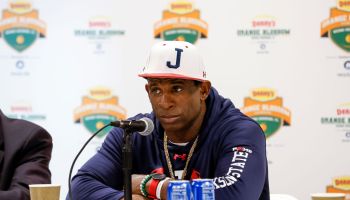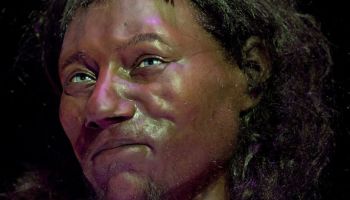NEW YORK — Jazz pianist and composer Hank Jones, whose 70-year career included a stint as Ella Fitzgerald’s pianist and Marilyn Monroe’s accompanist when she sang “Happy Birthday” to President John F. Kennedy, has died, his manager said Monday. He was 91.
Jones, who won a Grammy lifetime achievement award last year and received the National Medal of Arts from President George W. Bush in 2008, died Sunday night at a New York hospital after a brief illness, Jean-Pierre Leduc said.
A tireless musician who performed his blend of swing and bebop until the end, Jones came from a family of jazz musicians who included brothers Thad, a trumpeter, composer and arranger, and Elvin, a drummer known for the polyrhythmic beat that propelled John Coltrane’s classic quartet.
Click here to view photos:
RELATED: Top 5 Black Political Musicians
Saxophonist Joe Lovano, with whom Jones made several CDs when he was an octogenarian, including the Grammy-nominated “Kids: Live at Dizzy’s Club Coca-Cola” (2007), called Jones “one of the master musicians in the history of jazz.”
“He was the consummate accompanist and played with a very free flowing approach … His sound, his touch, his ideas were all about feeling,” Lovano said.
Throughout his career, Jones was respected by his fellow musicians for his elegant touch, melodic sensitivity and stylistic versatility, making hundreds of recordings, including more than 60 as a leader. He played with some of the biggest names in jazz, including Coleman Hawkins, Ben Webster, Wes Montgomery, Nancy Wilson, Lester Young, Charlie Parker and Coltrane.
According to his website, Jones’ one regret was that he didn’t record more often with his late brothers. But he did manage to record “The Great Trio Collaboration” with Elvin before his brother died in 2004. He was a charter member of the big band that brother Thad co-led with drummer Mel Lewis beginning in the mid-’60s at New York’s Village Vanguard jazz club.
RELATED: Top 10 Political Black Albums
Jones “lived and breathed music and was never far from a keyboard, even at the end,” Leduc said.
“His incredible burst of productivity – concerts, recordings, fundraisers, clinics – these last few years was unprecedented and truly remarkable. He had gigs planned through next year” and was scheduled to play at the Birdland jazz club in New York next week, he added.
At last year’s Jazz Awards, Jones was voted pianist of the year by the Jazz Journalists Association among a crowded field of nominees that included such distinguished veterans as Kenny Barron, Cecil Taylor, Ahmad Jamal and Keith Jarrett and newer faces like Jason Moran and Matthew Shipp. With characteristic modesty, Jones declared it “should be a group award.”
“This to me is an honor and also it’s a great incentive to me to do better,” Jones said in accepting the honor. “It’s not the end of things, it’s the end of the beginning for me.”
Jazz pianist-turned-impresario George Wein, who founded the Newport Jazz Festival, called Jones “an inspiration to all of us.
“Maybe by the time I’m his age, I’ll know a few changes that he plays on the piano,” joked the 83-year-old Wein at the awards ceremony.
Jones’ contemporary, saxophonist James Moody, who recorded “Our Delight” with the pianist, said, “If someone threw ink at a piece of paper, Hank could play it.”
In 1989, the National Endowment for the Arts named Jones as a Jazz Master, the nation’s highest honor in jazz.
Jones “leaves behind an amazing legacy as both a leader and a sideman,” NEA Chairman Rocco Landesman said of his death.
RELATED: OPINION: Michael Jackson’s Greatest Gifts
Born in Vicksburg, Miss., and raised in Pontiac, Mich., near Detroit, he was influenced by such legendary pianists as Art Tatum, Teddy Wilson and Nat King Cole.
Lovano said Jones knew them all, as well as Thelonious Monk and Bud Powell.
“He was on the scene with them in New York,” he said. “He had his own touch and approach from those relationships.”
He began performing at the age of 13, playing with territory bands that toured Michigan and Ohio. During those tours he met saxophonist Lucky Thompson, who helped him land a job in trumpeter Hot Lips Page’s band in 1944.
After moving to New York in 1943, Jones embraced bebop and toured with Norman Granz’s Jazz at the Philharmonic from 1947-51. As part of the ensemble, he became Fitzgerald’s pianist, touring with her from 1948-53.
In 1962, he accompanied Monroe on the piano when she sang “Happy Birthday” to President Kennedy at Madison Square Garden.
In a 2005 interview on National Public Radio, he described that day.
“She did 16 bars: eight bars of ‘Happy Birthday to You’ and eight bars of ‘Thanks for the Memories,'” he said. “So in 16 bars, we rehearsed eight hours. … She was very nervous and upset. She wasn’t used to that kind of thing. And, I guess, who wouldn’t be nervous singing “Happy Birthday” to the president?”
He also worked with such consummate musicians as Benny Goodman, Artie Shaw, Milt Jackson and Julian “Cannonball” Adderley. He joined CBS as studio pianist, a position he held for 17 years, performing on the Ed Sullivan Show and others.
His versatility also landed him gigs in Broadway stage bands, including a long-running stint as the pianist and conductor for “Ain’t Misbehavin’,” the hit 1970s musical revue based on songs by pianist Thomas “Fats” Waller.
After leaving CBS in the mid-’70s, Jones’ career flourished as a solo pianist and in small ensembles, including the Great Jazz Trio which he originally formed with Miles Davis alumni Ron Carter and Tony Williams.
His most recent recordings were “Pleased to Meet You,” an album with pianist Oliver Jones and “Come Sunday,” an as-yet unreleased duet recording with bassist Charlie Haden, a sequel to their 1995 album of spirituals, hymns and folk songs, “Steal Away,” which received two Grammy nominations.
“Hank was a man of elegance and genius yet remained so modest and full of humor throughout his life,” said Haden, who recorded “Come Sunday” with Jones in February. At that session, Haden said, “Hank seemed … closer than ever to the reverence of the songs that we played. … He was – and will always be – a beautiful soul.”
















